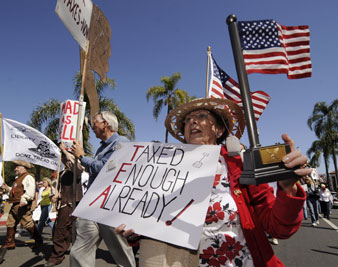 Reuters Photos
Reuters Photos
Anita Dwyer participates in a rally and march in protest of higher taxes in Santa Barbara, California, April 4, 2009.
Robert Scheer is the editor of Truthdig, where this article originally appeared. His latest book is The Pornography of Power: How Defense Hawks Hijacked 9/11 and Weakened America(Twelve).
One wonders if Phil Gramm has been made just a tad nervous by the news on Tuesday that one of UBS’s super-wealthy private clients has pleaded guilty to tax evasion. That’s the second case in two weeks involving the bank at which the former senator is a vice chairman, and 100 other clients are under investigation for possible bank-assisted tax fraud.
Gramm, the Republican former chair of the Senate Finance Committee, where he authored much of the deregulatory legislation at the heart of the current banking meltdown, has for the six years since he left office helped lead a foreign-owned bank specializing in tax dodges for the wealthy. These schemes by the Swiss-based UBS not only force the rest of us taxpayers to pay more to make up the government revenue shortfall but are blatantly illegal. In February, UBS admitted to having committed fraud and conspiracy and agreed to pay a fine of $780 million. Republican “Tea Baggers” take note: Offshore tax havens do not equal populist revolt.
In the UBS “deferred prosecution agreement” with the Justice Department, the bank agreed to turn over the names of its secret account holders to avoid a criminal indictment. The complicity of top executives in this far-ranging scheme to use foreign tax havens to cheat the US treasury of billions in uncollected taxes was noted at the time in a Justice Department statement: “Swiss bankers routinely traveled to the United States to market Swiss bank secrecy to United States clients interested in attempting to evade United States income taxes.”
What did Gramm think all of those Swiss bankers from his firm were doing over here? Was he totally clueless? The Justice Department statement suggests otherwise: “UBS executives knew that UBS’s cross-border business violated the law. They refused to stop this activity, however, and in fact instructed their bankers to grow the business. The reason was money–the business was too profitable to give up. This was not a mere compliance oversight, but rather a knowing crime motivated by greed and disrespect of the law.”
Is it conceivable that this “knowing crime,” so widespread within the UBS enterprise, was unknown to Vice Chairman Gramm–even though it primarily involved US tax evasion, and he had been hired by the company because of his expertise in American law, some of which he helped to write? As Gramm said when he was hired in 2002 by UBS, the position “will provide me with the opportunity to practice what I have always preached. I have been involved in every major financial debate since I’ve been in the Congress.”
How could Gramm, who prides himself on expertise in these matters, have been unaware of the damage that the Swiss bankers who worked for him were doing to American taxpayers saddled with making up the shortfall in government revenue? As the Justice Department said: “In 2004 alone, Swiss bankers allegedly traveled to the United States approximately 3,800 times to discuss their clients’ Swiss bank accounts. The information further alleges that UBS managers and employees used encrypted laptops and other counter-surveillance techniques to help prevent the detection of their marketing efforts and the identities and offshore assets of their U.S. clients.”
But then again, if you are Phil Gramm or his wife, Wendy, you might expect to get away with a great deal in the way of financial machinations. After all, neither has ever been held legally responsible for the Enron debacle, in which the Gramms played a major part.
As a top government regulator, Wendy Gramm changed the rules to make Enron’s chicanery possible, and as the chairman of the Senate Finance Committee, Phil codified those rule changes into federal law. While Enron execs like Chairman Ken Lay (a major Gramm campaign contributor) were indicted, the charmed couple that created the loopholes Lay and others jumped through escaped legal responsibility.
After leaving the government, Wendy Gramm joined Enron’s board, where she headed the audit committee that managed to avoid auditing the company’s disgraceful accounting procedures–just as her husband has apparently looked the other way during his stint in the private sector with UBS.
Sure, Phil Gramm lost his position as the co-chairman of John McCain’s presidential campaign when he blamed the recession not on the banking deregulation he championed but rather the people of the United States, which he described as a “nation of whiners.” But that was a sideshow compared with the serious charges now swirling around UBS, charges that may finally prove to be Gramm’s undoing.


